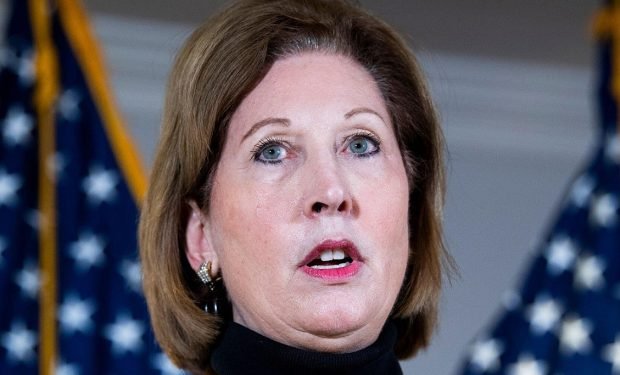During the Fulton County plea deal hearing for former Donald Trump attorney Sidney Powell, the proceedings were going smoothly — even amiably — with a cooperative defendant readily agreeing to the terms of the deal as articulated by the District Attorney’s Office. (Powell pleaded guilty to six misdemeanors accusing her of conspiring to intentionally interfere with the performance of election duties.)
But the proceedings came to an abrupt stop when the District Attorney’s Office asked Powell if she understood that while on the probation she is “not allowed to possess any firearms.”
Powell, who had been agreeing quickly to each of the DA’s previous conditions, was silent on this one, a long pause that finally ended when Fulton County Superior Court Judge Scott McAfee asked the prosecution if it was “sure” that a firearms prohibition was a proper condition of the deal. (Powell, the judge reminded, is pleading guilty to misdemeanor charges which may not trigger the firearms prohibition as stated by the DA’s Office.)
The parties agreed, in the interest of moving forward, that the language be changed to reflect that the plea “may” affect the defendant’s right to possess a firearm, so Powell didn’t have to agree that she’s prohibited from possessing a gun as part of the plea deal.
The long silence after the mention of a firearm prohibition (at the 12:10 mark of the video above) provides a chilling moment as part of Powell’s deal — the most significant part — is that she is agreeing to “truthfully testify at all hearings and proceedings and trials involving the co-defendants in this matter.”
That means likely being called to testify against Trump himself in the case. It also means that Trump and all the other (now) 17 co-defendants know it. Does that put Powell in danger? Especially given the former president’s ramping up his violent rhetoric of late, calling for executions, the shooting of shoplifters, and more?
In this violent context, the matter of Powell’s right to carry a gun is not just a legal technicality, but also perhaps a practical safety issue — and Powell’s clear reluctance to agree to a prohibition on firearms possession seems telling.
It could be that the lawyers — Powell herself, foremost — simply heard something surprising and inconsistent with the law and objected on those technical grounds. But there is a part in any careful observer of the current environment who might easily interpret her objection as Powell saying: don’t leave me without a gun.
